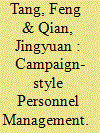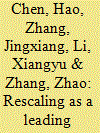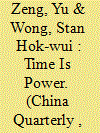| Srl | Item |
| 1 |
ID:
193213


|
|
|
|
|
| Summary/Abstract |
The anti-corruption campaign launched by General Secretary Xi Jinping has been one of the most far-reaching bureaucratic overhauls in modern Chinese history. How has Xi's crackdown on corruption shaped bureaucratic selection at the sub-provincial level? In this paper, we find that the purge has influenced how local ties are weighed in the appointment of prefecture city leaders. While it is common for provincial Party chiefs to appoint locally embedded officials to govern localities without high-profile corruption cases, they tend to appoint outside officials without local experience and connections to manage cities whose ex-leaders have recently been prosecuted for corruption. We argue that the provincial leaders’ objective of installing non-local officials is to exert hierarchical control and oversight in localities affected by corruption. Using an original dataset of all Party secretaries from China's 287 prefecture-level cities between 2013 and 2020, we find a significant divergence in the local embeddedness of officials who are appointed to replace corrupt ex-leaders and the embeddedness of those who fill the vacancies of transferred or retired predecessors. Our study sheds light on how Xi's anti-corruption campaign has reshaped the central–local relations and the logic of political control in China.
|
|
|
|
|
|
|
|
|
|
|
|
|
|
|
|
| 2 |
ID:
105171


|
|
|
|
|
| Publication |
2011.
|
| Summary/Abstract |
Is electoral competition good for political selection? To address this issue, we introduce a theoretical model where ideological parties select and allocate high-valence (experts) and low-valence (party loyalists) candidates into electoral districts. Voters care about a national policy (e.g., party ideology) and the valence of their district's candidates. High-valence candidates are more costly for the parties to recruit. We show that parties compete by selecting and allocating good politicians to the most contestable districts. Empirical evidence on Italian members of parliament confirms this prediction: politicians with higher ex ante quality, measured by years of schooling, previous market income, and local government experience, are more likely to run in contestable districts. Indeed, despite being different on average, politicians belonging to opposite political coalitions converge to high-quality levels in close electoral races. Furthermore, politicians elected in contestable districts have fewer absences in parliament, due to a selection effect more than to reelection incentives.
|
|
|
|
|
|
|
|
|
|
|
|
|
|
|
|
| 3 |
ID:
129098


|
|
|
|
|
| Publication |
2014.
|
| Summary/Abstract |
it is worthwhile to empirically probe the prominent value of the transformation process by employing the state rescaling perspective. However, the stated rescaling, as an important theoretical discourses, that not been s_\ stoically scrutinized in Chinese context. In this article. the empirical lrainexxorlx based on the central state--led regional planning and its changes is established and implemented to unfold the solution
tra_iector} of China's six state scaling stages since 1953. In the mean- time. it is argued that China's state rescaling is not resulted from o\enroll socioeconomic tt'ansforination. hut plays a role as the leading project. theoretical . it could he concluded that state rescaling in China is neither the product of internal 'natural economic process' nor the consequence triggered have the globalization. hut the outcome or" the state's politic political selection.
|
|
|
|
|
|
|
|
|
|
|
|
|
|
|
|
| 4 |
ID:
178884


|
|
|
|
|
| Summary/Abstract |
Whether local officials in China are promoted on a meritocratic basis has been the subject of long-standing debate. Merit is commonly gauged by a leader's ability to deliver local GDP growth. Although some find economic performance to be a strong predictor of the career success of local leaders, we argue that the existing measure, which focuses on the promotion outcome of a single career step, is problematic because the career success of individual local leaders is seldom determined by a single promotion, or the lack thereof. We propose an alternative measure that is more suitable for China's political context: the length of time until promotion. Analysing the time it takes to gain promotion for four types of local leaders, we find that good economic performance is associated with a shorter time until promotion. However, the cumulative time-reducing effect of economic performance is far from significant, as it is generally insufficient to help local leaders overcome the age ceiling for promotion.
|
|
|
|
|
|
|
|
|
|
|
|
|
|
|
|